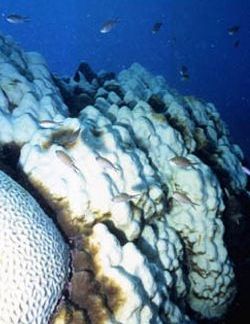Corals ‘killing themselves’ as oceans warm
 (Science Daily): Australian scientists have thrown new light on the mechanism behind the mass death of corals worldwide as Earth's climate warms. Coral bleaching, one of the most devastating events affecting coral reefs around the planet, is triggered by rising water temperatures. It occurs when the corals and their symbiotic algae become heat-stressed, and the algae which feed the corals either die or are expelled by the coral. A team of scientists from the ARC Centre of Excellence for Coral Reef Studies and James Cook University has shown that a complex cascade of molecular signals leading up to the self-inflicted death of corals and their symbiotic algae is triggered as sea water begins to warm.
(Science Daily): Australian scientists have thrown new light on the mechanism behind the mass death of corals worldwide as Earth's climate warms. Coral bleaching, one of the most devastating events affecting coral reefs around the planet, is triggered by rising water temperatures. It occurs when the corals and their symbiotic algae become heat-stressed, and the algae which feed the corals either die or are expelled by the coral. A team of scientists from the ARC Centre of Excellence for Coral Reef Studies and James Cook University has shown that a complex cascade of molecular signals leading up to the self-inflicted death of corals and their symbiotic algae is triggered as sea water begins to warm.
There have been seven major bleaching events globally in the past 30 years, the most recent being in 2010 across the Indian Ocean and Coral Triangle. Australia's Great Barrier Reef has suffered eight events since 1980, the worst being in 2002 when 55% of the total reef area was affected. The frequency of these events appears to be increasing.
Working with Acropora corals from the reef at Heron Island, the researchers found the cascade begins at ocean temperatures as much as 3 degrees lower than those normally associated with coral bleaching.
And the process culminates in 'apoptosis' or programmed cell-death — a situation in which living organisms (including corals and humans) deliberately destroy their weakened or infected body cells, effectively a form of 'cell suicide' or amputation designed to protect the organism as a whole.
"Our results suggest that the control of apoptosis is highly complex in the coral-algae symbiosis and that apoptotic cell death cascades potentially play key roles in tipping the cellular life or death balance during environmental stress prior to the onset of coral bleaching," explains lead author Dr Tracy Ainsworth.
Category: Science and Nature

